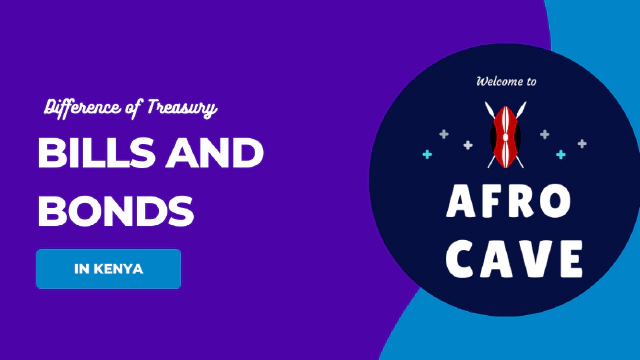The major difference between Treasury Bills and Treasury Bonds in Kenya is the length of maturity.
Treasury Bills (T-Bills) are a secure, short-term investment of one year or less and the minimum amount to buy Treasury Bills is KES 100,000.
Treasury Bonds (T-Bonds) are a secure, medium-to-long-term investment with a maturity of more than one year and require a minimum investment of KES 50,000.
On behalf of The National Treasury, the Central Bank auctions and manages Government’s domestic debt. At the beginning of each fiscal year, the National Treasury determines the budgetary gap to be financed from the domestic market.
The Central Bank then comes up with a borrowing plan which it implements through auctions of Treasury Bills and bonds.
Table of Contents Show/Hide
difference between Treasury Bills and Bonds in Kenya
What is the difference between Treasury Bills and bonds in Kenya?
Treasury Bills
Treasury Bills are a secure, short-term investment, offering an investor returns after a relatively short commitment of funds. Treasury Bill interest rates in Kenya are attractive, providing an excellent investment opportunity that is readily available, as they are auctioned each week.
Treasury Bills are sold at a discount. This means that investors choose the amount that they will receive when the bill matures, or the face value of the bill, and pay less than that amount when purchasing it.
Individuals and corporate bodies can invest in Treasury Bills as a nominee of a commercial bank or investment bank in Kenya, but if they hold a bank account with a local commercial bank, they can also invest directly through the Central Bank and avoid additional fees.
Government Securities are short-term or long-term government debt instruments (or obligations) sold (or issued) to finance its borrowings with a promise of payment upon maturity of the security’s date.
Treasury Bills are short-term government securities that are purchased at a discount and mature over a specified period. The government of Kenya, through the Central Bank of Kenya, issues (sells) Treasury Bills for 91, 182 and 364 days.
Purchasing at a discount means that an investor pays less than the bill’s face value, then receives that face value thereafter on the specified maturity date.
For example, if an investor wants to purchase a 364-day Treasury Bill with a face value of KES 100,000 at a yield of 10% per annum attracting a 15% withholding tax, he or she would pay KES 92,292.20 and upon maturity after 364 days, that investor would receive the full face (par) value of KES 100,000.
Currently, the minimum amount one needs to have to buy Treasury Bills is KES 100,000 and any amount above the minimum shall be in multiples of KES 50,000.
The 91 Day, 182 Day and 364 Day Treasury Bills are debt obligations issued by the Central Bank of Kenya, on behalf of the Kenya Government, for 3, 6 or 12 months at either a discount or face value, at a competitive auction every week.
A discount means the instrument is sold to an investor at below the face value and then redeemed at maturity at the full face value. The difference between the discounted price and the face value determines the yield or interest earned. The yield on 91-day, 182-day and 364-day Treasury Bills are the average 91-day, 182-day and 364-day discount rates.
Lenders use these average rates to adjust interest rates on loans and corporate bonds as economic conditions change. They then add a certain number of percentage points, called a margin, which doesn’t vary, to it to establish the interest rate they must pay or will earn in the case of a corporate bond. When the rate goes up, interest rates on any loans or corporate bonds tied to it also go up.
Treasury Bonds
Treasury Bonds are a secure, medium-to-long-term investment that typically offers an investor interest payment every six months throughout the bond’s maturity. The Central Bank auctions Treasury Bonds every month but offers a variety of bonds throughout the year.
Most Treasury Bonds in Kenya are fixed-rate, meaning that the interest rate determined at auction is locked in for the entire life of the bond. This makes Treasury Bonds a predictable, long-term source of income. The National Treasury also occasionally issues tax-exempt infrastructure bonds, a very attractive investment.
Individuals and corporate bodies can invest in Treasury Bonds as a nominee of a commercial bank or investment bank in Kenya, but if they hold a bank account with a local commercial bank, they can also invest directly through the Central Bank and avoid additional fees.
In Kenya, Treasury Bonds are medium to long-term government securities with different maturity periods above 1 year. Investors buying Treasury Bonds are loaning the government money for a specified period, which is the bond’s maturity period.
With most bonds, investors receive fixed interest payments (coupons) every six months throughout that period, and at the end of that period, they receive back the face value amount that they had invested. To purchase a Treasury bond, an investor must have a minimum of KES 50,000.
The types of Treasury Bonds may be defined by the purpose, interest rate structure, maturity structure, and even by the issuer. So far, the government has issued Fixed-Coupon or Rate Bonds, Zero Coupon Bonds, Floating Rate Bonds, Infrastructure (Project Specific) Bonds, Restructuring or Special Bonds, and Amortized and Savings Development Bonds.
The most commonly issued bonds are fixed coupon bonds, which have huge investor demand. Treasury Bonds are issued monthly.
Fixed coupon Treasury Bonds – Bear predetermined or market-derived fixed coupon (interest), which is paid semi-annually on the face value held during the life of the bond. When bought at a discount (required yield higher than coupon), investors benefit from discount (capital gain), which is critical for secondary market trading and regular interest payment.
Infrastructure Bonds – Proceeds are used to fund specific infrastructure projects specified in the prospectus.
Floating Rate Bonds – Pay semi-annual interest based on a benchmark rate, for example, the average rate of 91-day or 182-day Treasury Bills, plus some margin. They are in high demand in a high inflationary environment.
Zero-Coupon Bonds – Do not have fixed interest and investor’s return is only the discount amount equivalent to the yield quoted. Mostly short term and mostly taken up by commercial banks.

